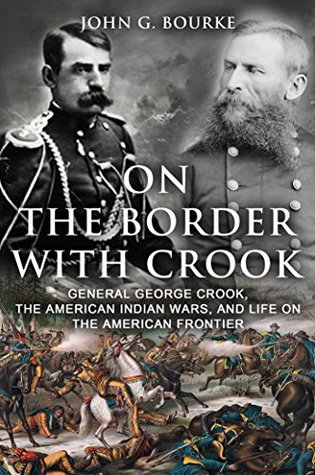More on this book
Kindle Notes & Highlights
you can never know a man until after having made a scout with him in bad weather.
“When you see Apache ‘sign,’ be keerful; ‘n’ when you don’ see nary sign, be more keerful.”
A better acquaintance with old Jack showed that, like the chestnut, his roughest part was on the outside. Courage, tenderness, truth, and other manly attributes peered out from under roughness of garb and speech. He was one of Gray’s “gems of purest ray serene,” born in “the dark, unfathomed caves” of frontier isolation.
Strangest recollection of all that I have of those persons is the quietness of their manner and the low tone in which they usually spoke to their neighbors. They were quiet in dress, in speech, and in conduct — a marked difference from the more thoroughly dramatized border characters of later days.
Despite the hyperborean temperature, the genial good-humor and cheerfulness of the whole command was remarkable and deserving of honorable mention. Nothing tries the spirit and temper of the old veteran, not to mention the young recruit, as does campaigning under unusual climatic vicissitudes, at a time when no trace of the enemy is to be seen. To march into battle with banners flying, drums beating, and the pulse throbbing high with the promptings of honorable ambition and enthusiasm, in unison with the roar of artillery, does not call for half the nerve and determination that must be daily
...more
They advanced in excellent style, yelling and whooping, and glad of the opportunity of wiping us off the face of the earth.
They differed also from the Apaches in being very fond of fish; the Apaches could not be persuaded to touch anything with scales upon it, or any bird which lived upon fish; but the Shoshones had more sense, and made the most of their opportunity to fill themselves with the delicious trout of the mountain streams. They did not bother much about hooks and lines, flies, casts, and appliances and tricks of that kind, but set to work methodically to get the biggest mess the streams would yield. They made a dam of rocks and a wattle-work of willow, through which the water could pass without much
...more
The Shoshone boys would drive their lances into the coil from three or four different directions, exclaiming at the same time: “Gott tammee you! Gott tammee you!” which was all the English they had been able to master.
A cavalry guidon, nearly new and torn from the staff; an army officer’s overcoat; a non-commissioned officer’s blouse; cavalry saddles of the MeClellan model, covered with black leather after the latest pattern of the ordnance bureau; a glove marked with the name of Captain Keogh; a letter addressed to a private soldier in the Seventh Cavalry; horses branded U. S. and 7 C. — one was branded: D 7 C. were proofs that the members of this band had taken part, and a conspicuous part, in the Custer massacre.
He dismounted from his pony, sat down upon the ground, and said that then was the best time for smoking the pipe of peace. He then held out his left hand to Clarke, telling him: “Cola (friend), I shake with this hand because my heart is on this side; I want this peace to last forever.”
His father and ‘Touch the Clouds,’ chief of the Sans Arcs, remained with him till he died, and when his breath ceased, the chief laid his hand on ‘Crazy Horse’s’ breast and said: ‘It is good; he has looked for death, and it has come.’
To the occurrences of the next four years I will devote very few paragraphs, because, although they formed an epoch of great importance in our Indo-military history and in General Crook’s career, they have previously received a fair share of my attention in the volume, “An Apache Campaign,” to which there is little to add.
But all this must be put down as “whimsical,” because there is no money in it “for the boys,” The great principle of American politics, regardless of party lines, is that “the boys” must be taken care of at all times and in all places.
they dissembled their resentment for a few days until they had caught the chief of police, killed him, cut off his head, played a game of football with it, and started for the Mexican boundary in high glee.
Greed and avarice on the part of the whites — in other words, the almighty dollar — is at the bottom of nine-tenths of all our Indian trouble.”
Crook was not the man to lie to any one or deal treacherously by him. If there was one point in his character which shone more resplendent than any other, it was his absolute integrity in his dealings with representatives of inferior races: he was not content with telling the truth, he was careful to see that the interpretation had been so made that the Indians understood every word and grasped every idea; and all his remarks were put down in black and white, which, to quote his own words, “would not lie, and would last long after the conferees had been dead and buried.”
As the earth closed over the remains of a man whom I had known and loved for many years, and of whose distinguished services I had intimate personal knowledge, the thought flitted through my mind that there lay an exemplification of the restless energy of the American people.


